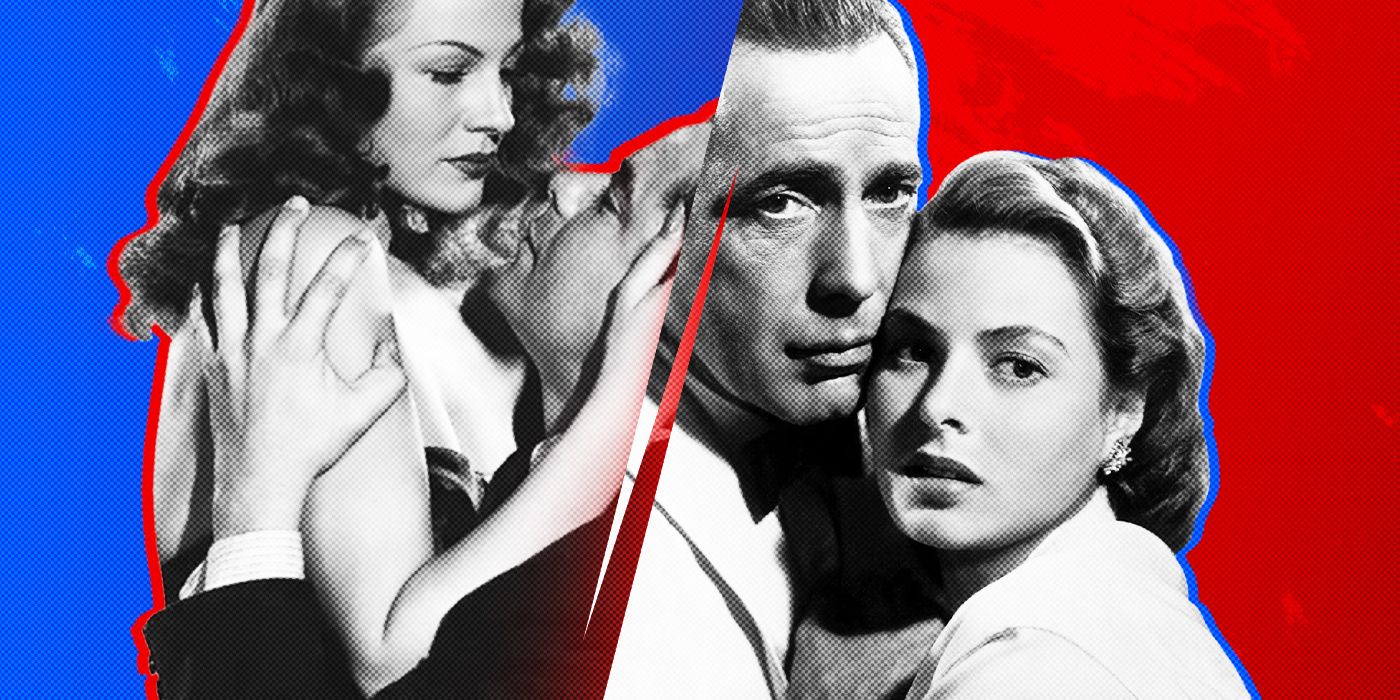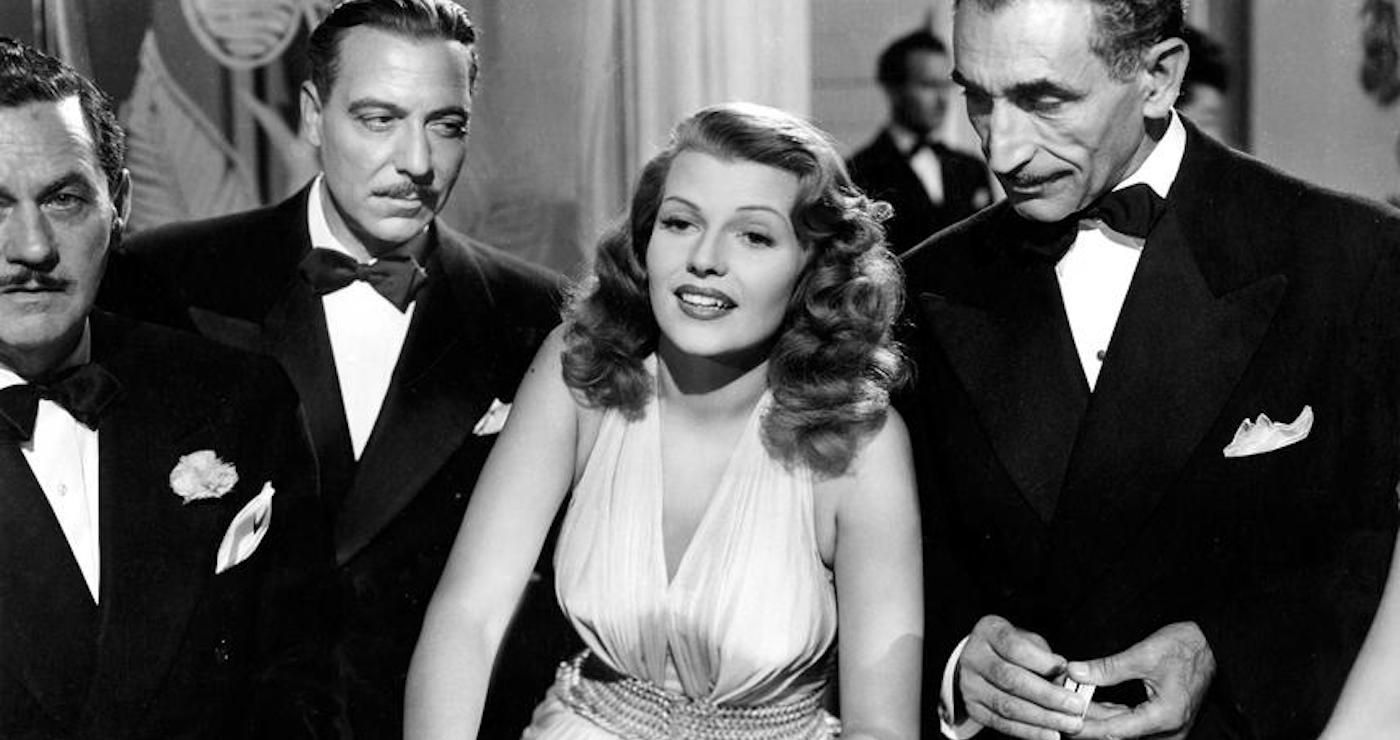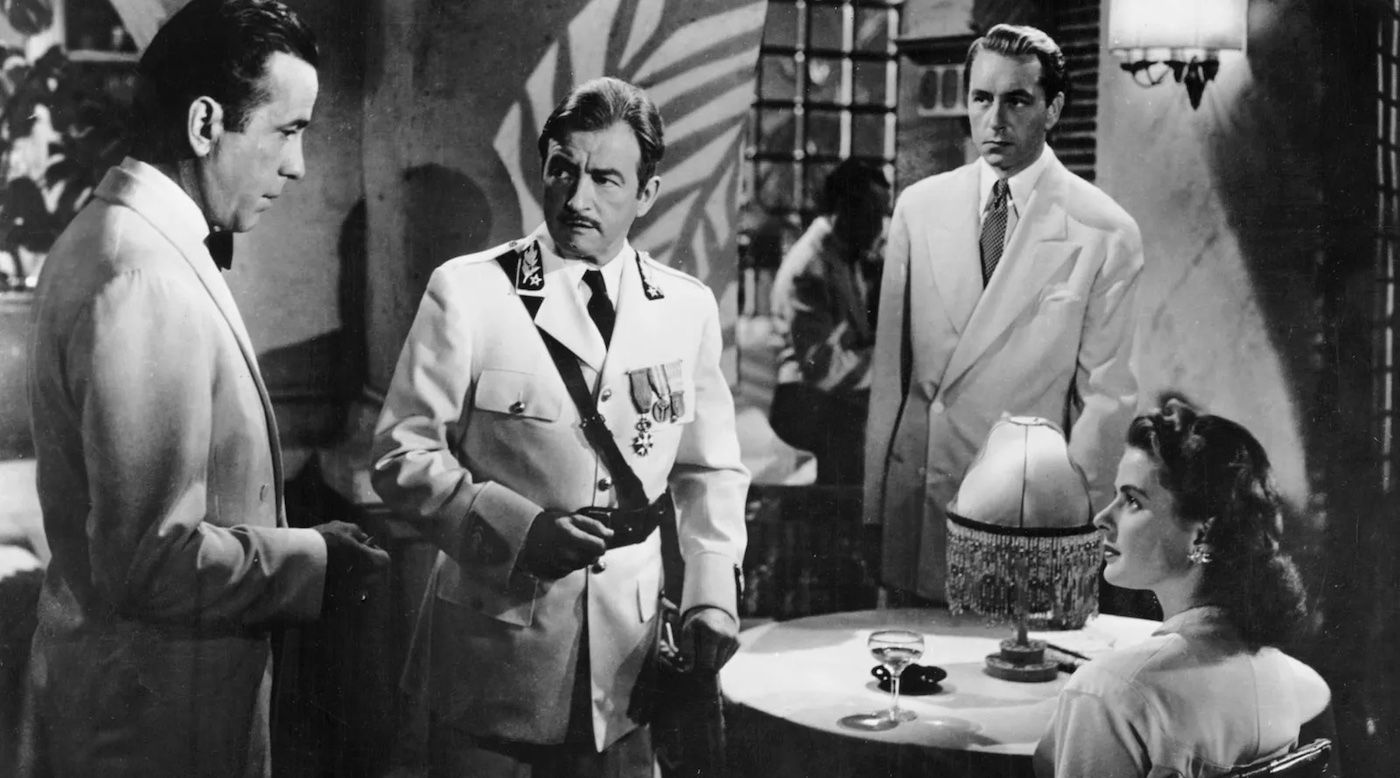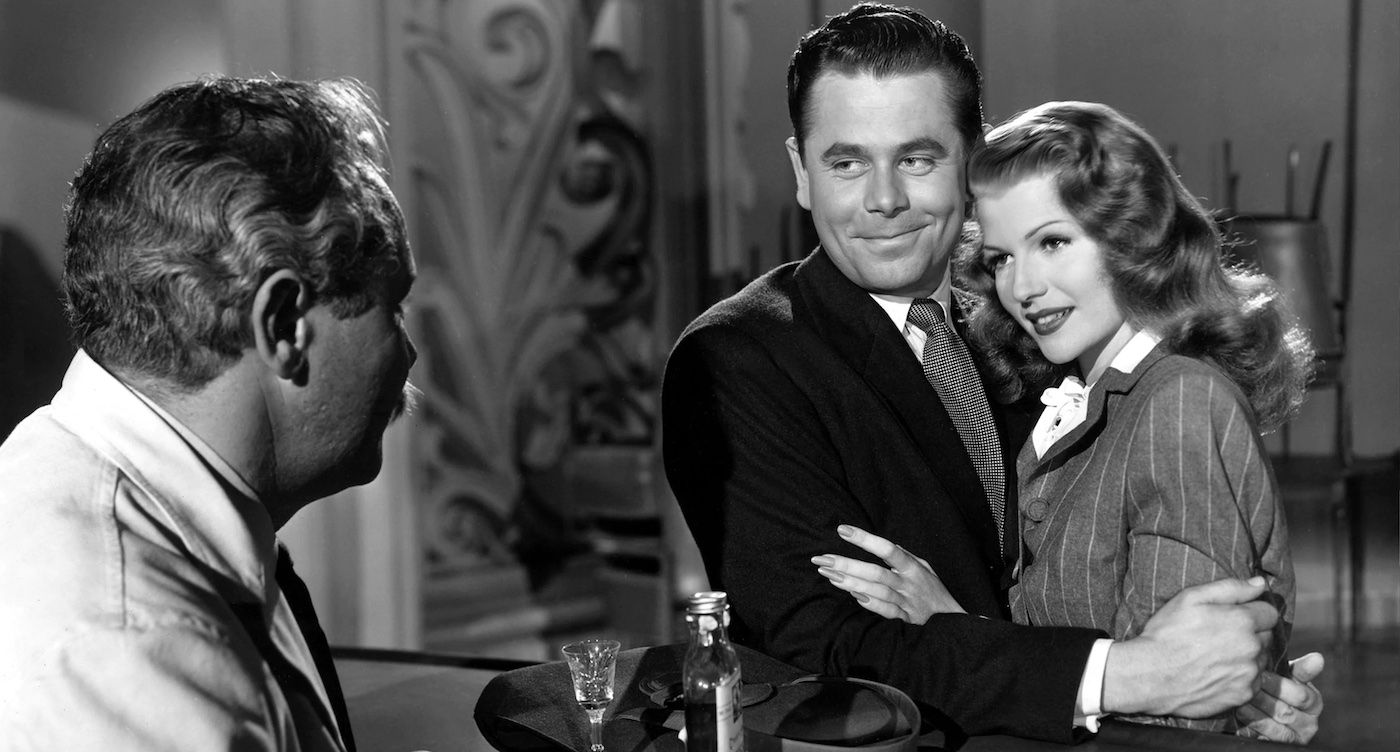The impact of Michael Curtiz’s Casablanca was so profound and widespread, that it only took four years for a younger, more rebellious sibling to make its way into the world. Charles Vidor’s Gilda (1946) bears more than a passing resemblance to its predecessor whilst oozing an erotic pizzaz in lieu of patriotism. Both films have a dysfunctional love triangle at the core, are set in dodgy casinos, and end with a good old-fashioned police cover-up to ensure the Hays Office - the bastions of decency who governed what could and could not be shown on the silver screen - got their happy and hetero resolution: just a couple of lovebirds in the wrong place at the wrong time, eh Guv? Although each film is now considered a noir classic, the romance that saw Humphrey Bogart and Ingrid Bergman bring hope and swoony grins to wartime audiences was critically leagues ahead of Gilda’s post-war love triangle about a Nazi sympathizer (George Macready), his vivacious new bride (Rita Hayworth), and a man punching above his weight (Glenn Ford).
It has been argued that the enthusiasm of the French towards Gilda was less a result of sophistication, and more a consequence of timing: WWII saw France denied access to US films, resulting in a deluge of releases by the time Gilda had its premiere. However, it is difficult to imagine that White Chicks would have been met with greater acclaim had it been viewed after the seven-year hiatus of the invasion of Iraq, therefore, one might conclude that the qualities Gilda presents were quite simply more suited to the European sensibility; the pessimism, sense of doom, and sexual frankness American critics found confusing, silly, and gratuitous, were relished abroad. But, ultimately, it was Casablanca, with its message of beauty within sacrifice, that proved the real hit, winning Best Picture, Director, and Screenplay, whilst Gilda was left in the dust.
The evil and salaciousness that pervades Gilda are hard to define and difficult to pinpoint. Unlike Casablanca, where the constant presence of Nazis and war as talking points provide an obvious threat, Gilda’s backdrop, post-war with a subplot involving a Nazi sympathizer selling tungsten to the enemy, is pure MacGuffin. The lingering danger and allusions to war are present, but fail to feed the overall tension. This does not, however, detract from the enjoyment of the film, as Gilda’s love/hate triangle provides more than adequate compensation.
At the apex of both films stands the women, polar opposites in character. Bergman as Ilsa Lund, the epitome of goodness who has ultimately put duty before love. Reserved and loyal, Ilsa has bravery in spades and shows patriotism in its best light. Gilda, on the other hand, is living her best life, taking orders from no one and getting her jollies from being contrary. The more her actions infuriate Johnny, the closer she is to screaming “Yahtzee!” That is until he becomes an outright psychopath, trapping her in the mansion and keeping her under surveillance. At this point, with fewer options to flaunt her wares, Gilda is compelled to free herself from Johnny's clutches and declare her hatred for him. Which, unsurprisingly, is reciprocated. Conversely, Ilsa is champing at the bit to proclaim her love for Rick but remains guarded until the point of no return - for king and country, and all that jazz.
Where Ilsa has a compelling sense of allegiance, Gilda is devoted to herself, Ballin comparing her to a “beautiful, greedy child.” Her flamboyance is apparent from the get-go, exploding from the bottom of the screen with a hair flip and coquettish opening line, and within moments, is taunting her ex, dismissing him as one with “a very easy name to forget.” Conversely, Ilsa’s first encounter with her lost love is through barely-concealed tears, their song playing at her request, and the warm nostalgia that only regret and piano music can provide. When they lock eyes, there is shock, disbelief, happiness, and probably disappointment that the other hasn’t become haggard and taken to adopting cats.
Rick, with his wit, cynicism, and “we’ll always have Paris'' silver linings, is a reluctant hero, but a hero nonetheless. He has no desire to hurt Ilsa and moves swiftly from an every-man-for-himself dogma to putting his life in danger to help her and her new fella make a go of it. His belief that their personal problems “don’t amount to a hill of beans” makes the audience root for his personal happiness above all else, making the film’s conclusion all the more bitter-sweet. But Casablanca’s triangle is a complex one, made all the more difficult by the fact that Ilsa’s husband, Victor Laszlo (Paul Henreid), is not a complete asshole. Unlike Ballin Mundson, Laszlo is no villain. He is noble, kind, and on the side of good, which is a crying shame for all concerned. According to Rudy Behlmer in the book Inside Warner Bros, the character is so honorable that writers felt the only way Ilsa and Rick could end up together was to kill him off. Ultimately, this was vetoed, with Casey Robinson (an uncredited writer on the film) feeling the now-infamous ending was more honest due to the consequence that Ilsa would “carry on with the work that in these days is far more important than the love of two little people." When you’re right, you’re right.
Contrasting with Rick’s “here’s looking at you, kid” cool, Johnny Farrell is driven by resentment. In fact, the entire film backs the horse of hatred far more than freedom, love, or any idealism that may shine through its predecessor. Johnny’s back-and-forth with Gilda is fuelled by disdain, one which seems to have colored his views on women generally. To this end, it is unclear whether his modus operandi is driven by love (presented as loyalty) for his employer (Ballin) or his own thirst for revenge on the woman who wronged him. One thing is certain, and that is that both he and Ballin are “stinkers.” Unlike the dynamic in Casablanca, this triangle is borne of perversity rather than circumstance, and when the young couple finally declares their undying hatred for one another, it is through scarcely lit shadows that instill dread for what’s to come. Fortunately, those requiring a bathroom break needn’t endure discomfort for long, with mere seconds passing before Ballin has caught the two in a hateful but passionate kiss, fled the mansion, jumped into his private plane, and, by all accounts, committed suicide (he actually parachutes to safety). All’s well that ends well, am I right?
Except that it doesn’t. No sooner has Johnny watched his boss’s plane burst into flames does he decide the best course of action to assuage his guilt or continue the misogyny (depending on which angle you choose), is to marry the widow and keep her imprisoned in their mansion. No more gallivanting on the dance floor, and certainly no more stripteases. “Disaster to the wench,” they once toasted, and so it came to pass. As Ilsa and Rick’s tenderness grows in Casablanca, so does the hatred between Gilda and Johnny in Gilda, culminating in Gilda's declaration that she would kill herself if it meant taking him down too. You gotta admire the commitment. This brings us to the third party in the ornery threesome, Ballin Mudson: casino owner, snappy dresser, and Nazi sympathizer. Not half as concerned with Gilda’s precociousness as he is with Johnny’s loyalty, Ballin makes tentative allusions to her becoming part of his trusted posse.
Of course, Johnny and his inferiority complex will have none of it, a sentiment that makes Ballin suspicious of both parties. Ballin doesn’t dig too deeply into his own theories, but simply makes up his mind that betrayal is afoot and takes a back seat in the form of the aforementioned faux suicide, presumably giving himself the freedom to continue doing the dodgy things he does without the scrutiny of the living. It’s difficult to pinpoint the exact nature of these dealings and feelings, mainly due to plot holes large enough to drive a bus through, but the very presence of Ballin, "dead" or alive, adds to the eerie inevitability; a sense that even without the parade of nazis, raids, and warfare that pervade Casablanca, there is a very real and present wickedness in the air of Gilda.
This feeling of depravity caused by occupation and war in Casablanca is created by the individuals in Gilda, with their collective resentments potentially more bitter, certainly more palpable. There’s nothing subtle about the type of immorality Gilda plays up to. Gilda's offer to “help (Johnny) get back in practice. Dancing I mean,” is as direct as she gets, relying on her body to taunt her old flame and ensure his fears and impotence are proudly put on display. As the to-kill-or-not-to-kill Laszlo was a point of contention in the making of Casablanca, the censors were at it again with Gilda, shaking their heads over the final severing of the triangle. Their insistence that a woman could not be seen to leave her husband was one of many logistical reasons Ilsa remained with Laszlo, but with Ballin Mudson being a Nazi and all, a sense of duty wasn’t going to satisfy. For this reason, a gunshot (deemed to be in self-defense, naturally) and an out-of-nowhere assertion that Gilda’s scandalous reputation was nothing more than rumor meant the two ex-lovers could reunite ethically, and morally - all loose ends tied up nicely.
Casablanca doesn't scrimp on its ending, remaining authentic and by no means guaranteeing future happiness for Ilsa and Laszlo. And whether Rick and his new best friend get to Brazzaville to make a go of life with the Free French is TBA, to say the least. But the sense that the right choices have been made, and that all parties may well experience the beginning of a beautiful friendship feels possible. Each character struggles with their heads and hearts, with the leads ultimately falling on the side of virtue, but not without having earned the audience’s applause and love. In contrast, the hasty conclusion to Gilda feels like a cheat, the equivalent of “it was all just a dream” which speaks to its inability to overcome the cast iron edicts of the Hays Code. The conclusion which sees Johnny’s devotion to his boss end abruptly and Gilda getting a clean bill of health insofar as her purity is concerned might have been an A+ for the censors, but it is too far-fetched as a credible happily ever after. To use the vernacular of the time, it’s a load of hooey.





